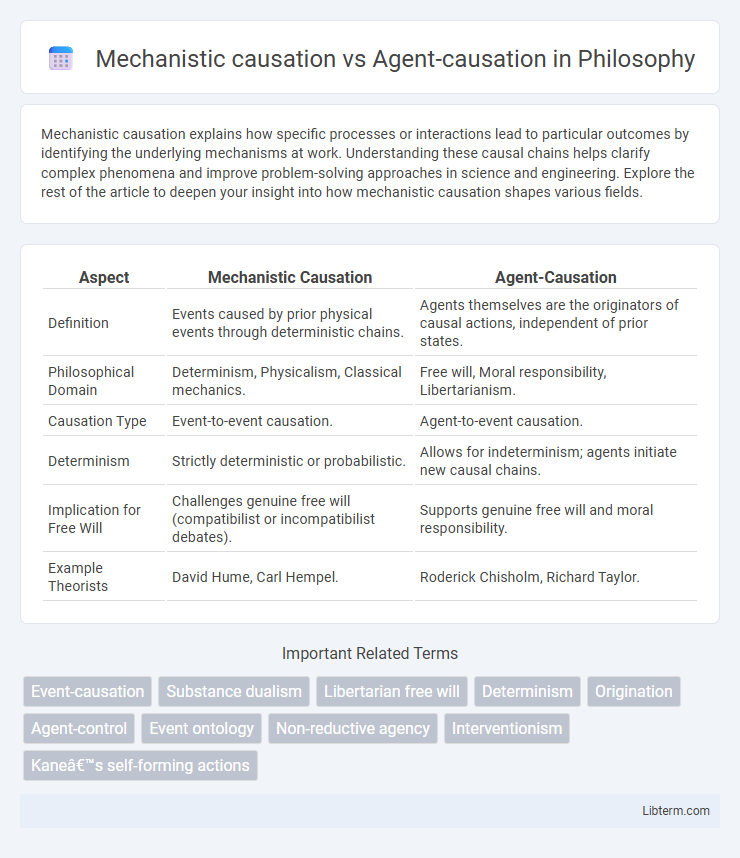Mechanistic causation explains how specific processes or interactions lead to particular outcomes by identifying the underlying mechanisms at work. Understanding these causal chains helps clarify complex phenomena and improve problem-solving approaches in science and engineering. Explore the rest of the article to deepen your insight into how mechanistic causation shapes various fields.
Table of Comparison
| Aspect | Mechanistic Causation | Agent-Causation |
|---|---|---|
| Definition | Events caused by prior physical events through deterministic chains. | Agents themselves are the originators of causal actions, independent of prior states. |
| Philosophical Domain | Determinism, Physicalism, Classical mechanics. | Free will, Moral responsibility, Libertarianism. |
| Causation Type | Event-to-event causation. | Agent-to-event causation. |
| Determinism | Strictly deterministic or probabilistic. | Allows for indeterminism; agents initiate new causal chains. |
| Implication for Free Will | Challenges genuine free will (compatibilist or incompatibilist debates). | Supports genuine free will and moral responsibility. |
| Example Theorists | David Hume, Carl Hempel. | Roderick Chisholm, Richard Taylor. |
Understanding Causation: Mechanistic vs Agent-Causation
Mechanistic causation explains events through physical processes and prior conditions, emphasizing a chain of cause and effect governed by natural laws. Agent-causation attributes causal power to conscious agents who initiate actions independently of deterministic mechanisms. Understanding causation requires distinguishing between these perspectives to grasp how causes operate either through impersonal processes or intentional agency.
Historical Background of Causal Theories
The historical background of causal theories reveals that mechanistic causation emerged from the scientific revolution, emphasizing deterministic physical laws governing cause and effect. In contrast, agent-causation has roots in ancient philosophy, particularly in Aristotelian and medieval scholastic traditions, which highlight the role of conscious agents as originators of actions. This divergence reflects foundational debates on whether causality is best explained through impersonal mechanisms or intentional agency.
Defining Mechanistic Causation
Mechanistic causation refers to the explanation of events through the identification of underlying physical processes and interactions governed by natural laws, where causes are understood as parts of a system producing effects via mechanistic pathways. This concept emphasizes deterministic relationships, often modeled in scientific contexts, where every effect can be traced to a sequence of prior states and interactions among components. Unlike agent-causation, mechanistic causation does not rely on the intentional actions of agents but on objective, observable mechanisms within the physical world.
Core Principles of Agent-Causation
Agent-causation centers on the concept that agents themselves possess the power to initiate actions independently of prior physical events, emphasizing intentionality and self-determination. Core principles of agent-causation include the capacity for agents to be originators of causal chains, the intrinsic freedom of agents to choose actions without deterministic constraints, and the idea that agents' decisions are not reducible to mechanistic interactions. This framework challenges mechanistic causation by arguing that causality in human actions cannot be fully explained through physical laws or prior states alone.
Key Differences Between Mechanistic and Agent-Causation
Mechanistic causation emphasizes deterministic processes governed by physical laws and prior states, where events are caused by preceding conditions in a causal chain. Agent-causation posits that agents, as autonomous entities, initiate new causal chains through intentional actions, not fully reducible to physical causation. Key differences lie in mechanistic causation's reliance on impersonal, law-governed interactions versus agent-causation's emphasis on free will and intentionality as sources of causality.
Philosophical Implications of Both Approaches
Mechanistic causation, grounded in deterministic physical laws, suggests that all events, including human actions, are the results of prior states, raising questions about free will and moral responsibility. Agent-causation posits that agents themselves can initiate new causal chains independently of prior events, preserving notions of autonomy and accountability. The philosophical implications revolve around reconciling human freedom with a potentially deterministic universe, challenging debates in metaphysics, ethics, and the philosophy of mind.
Mechanistic Causation in Natural Sciences
Mechanistic causation in natural sciences explains phenomena through physical processes and interactions among components within a system, emphasizing deterministic relationships and causal chains. This approach relies on observable and measurable events, such as biochemical reactions or physical laws, to predict and control outcomes. The framework contrasts with agent-causation by focusing on impersonal mechanisms rather than intentional agents as the source of causality.
Agent-Causation in Ethics and Free Will
Agent-causation in ethics and free will emphasizes that individuals possess the inherent power to initiate actions independently of prior states or deterministic mechanisms. This concept supports moral responsibility by attributing actions directly to the agent's autonomous will rather than external causality. Philosophers such as Roderick Chisholm advocate agent-causation to defend libertarian free will, suggesting that agents are the true originators of their choices, enabling ethical accountability.
Critiques and Counterarguments for Each Theory
Mechanistic causation faces critiques for its reductionist approach, often overlooking the role of conscious agency and intentionality in human actions. Critics argue that agent-causation counters this by emphasizing agents as originators of actions, but it struggles with explaining how agents can cause events without being subject to prior physical conditions. Counterarguments for mechanistic views highlight the explanatory power of physical laws, while agent-causation proponents defend the irreducibility of free will and moral responsibility.
The Future of Causal Explanations in Philosophy
Mechanistic causation emphasizes cause-and-effect relationships grounded in physical processes and systems, providing clear, empirically testable explanations. Agent-causation centers on the role of conscious agents as origins of causal events, highlighting autonomy and free will in philosophical discourse. The future of causal explanations in philosophy likely involves integrating these perspectives to develop comprehensive models that address both deterministic mechanisms and intentional agency.
Mechanistic causation Infographic

 libterm.com
libterm.com